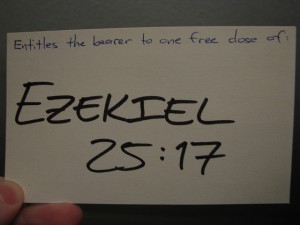I was hungry for bread, but my mouth was full of wheat stalks and wild yeast.
That’s what it felt like when I tried to read the Bible all the way through the first time. I was home from college on vacation, with a view of miles of desert that invisibly morphed into Mexico. Perhaps that’s why I decided to read it Lone Ranger style: no rules, just me and my paperback NIV in my room. I started on page one with Genesis, those familiar Sunday-school favorites igniting my hope that I’d finally learn the whole story.
I made it as far as the book of Judges.
I couldn’t muddle on anymore through the darkness, the violence, the lists of names. I couldn’t see a big-picture Story in this; it seemed like a bunch of disconnected episodes for which I’d never figure out the context. The Jesus story I felt I understood (mostly), but what was all this about animal sacrifice and marriage taboos and census numbers? What did the one thing have to do with the other? Why were they part of the same Book?
I was hungry, and it wasn’t feeding me. So I gave up on it for years. I did enough reading for class, I reasoned. It wasn’t until 2010 that I started reading it regularly for the first time, finishing the entire text a year later. Since then I’ve reread it three times in full and just started again. I’ve found that each time, it gets better and more satisfying.
The problem was that trying to read the Bible alone, with no guidance or vision, was like trying to choke down wheat berries and yeast and call it a loaf of bread. All the nourishment I sought was there, but I couldn’t take it in until the text was properly “cooked.” For those whose reading experiences have been similarly unsatisfying, I have this hard-won advice to offer.
First, don’t go it alone. One thing that really helped me during my first read-through in 2010 was my partner’s unexpected and kind commitment to read along with me. Without her encouragement, I might never have made it through. We’d read out loud to each other sometimes, and each of us would remember connections the other forgot. Reading in a group, especially a faith community, is great if you can manage it. Don’t forget to lean on the scholarly community as well – a good study Bible has often been my best friend when figuring out context and narrative structure. And finally, when you feel like you just can’t make it through another genealogy, asking for understanding from God (as you understand God) can be truly invaluable.
Second, make it bite-size. As with any big goal, reading the entire Bible is easier for many of us if it’s broken down into relatively easy steps. Luckily, there are many plans out there that have done the work for you, breaking down the number of chapters you need to read daily to finish in a certain amount of time (most commonly a year or two years). Some, like those through Discipleship Journal, even factor in extra days so you can catch up if needed. Bible reading plans also make it easy to give yourself variety if you don’t want to go straight from beginning to end – some plans will give you a variety of readings from different parts of the Bible each day, while others have you read from a different “genre” of book each day of the week. Just in case you feel, as I did, like you’ll be stuck in Judges forever.
Third, keep the big picture in mind. Many folks find the New Testament far easier to read than the Old Testament. We Christians often don’t know what to do with the Hebrew Scriptures – what do they have to do with us, we ask ourselves, and when will we get to the good part? The fact is, the New Testament is intimately related to the Old. Both Jesus and Paul reference the Hebrew Scriptures constantly; the love story between the Israelites and God is their native tongue. So especially if you’re reading from beginning to end, keep your eye out for Old Testament symbols and promises that will form the backbone of the New Testament. One great resource that’s helped me practice seeing the big picture of Scripture is The Jesus Storybook Bible (written for children, but beloved by many adults).
Finally, don’t forget to savor and enjoy! Choose a translation that speaks to you, or even a modern paraphrase like The Message or The Voice. Create rituals for your Bible time that help you focus and enjoy, like reading outside on sunny days or curling up in your favorite chair with a cup of tea on rainy ones. Mark passages you love, things to which you want to return, words that spark questions in your heart, words that satisfy your hunger. Read out loud. Slow down, lectio divina style. Sing Psalms, dance prayers, retell the stories in your own words, feast your eyes on great religious art. Let it make you laugh, cry, hope, and dream.
As for me, I’m still chewing on this book. On my plate today is a few chapters of Exodus with a side of Proverbs. After a few complete read-throughs, while some parts have always gone down like candy, others have become acquired tastes for me, like arugula or olives. Often, it’s only after reading something for the third or fourth time that I’ve been able to see the beauty of it and exclaim, “This was holy ground all along!” I’m so glad I stopped trying to jam the text down my throat to fill my hunger and learned to savor it, properly cooked, as the feast it is.
Reposted from July 2013 to celebrate my fourth complete read-through of the Bible. It really does get better every time!




